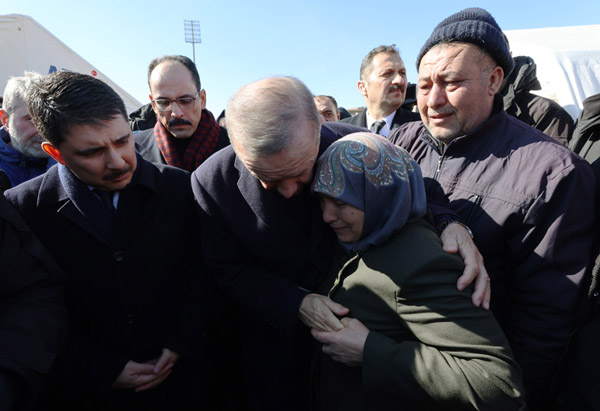
Source: AP
The president of Turkey on Wednesday acknowledged “shortcomings” in his country’s response to the world’s deadliest earthquake in more than a decade as hope dwindled that more survivors would emerge from the rubble of thousands of toppled buildings.
With the confirmed death toll approaching 12,000, President Recep Tayyip Erdogan visited the especially hard-hit Hatay province, where more than 3,300 people died and entire neighborhoods were destroyed. Residents there have criticized the government’s efforts, saying rescuers were slow to arrive.
Erdogan, who faces a tough battle for reelection in May, reacted to the mounting frustration by acknowledging problems with the emergency response to Monday’s 7.8-magnitude quake but said the winter weather had been a factor. The earthquake also destroyed the runway at Hatay’s airport, further disrupting the response.
“It is not possible to be prepared for such a disaster,” Erdogan said. “We will not leave any of our citizens uncared for.” He also hit back at critics, saying “dishonorable people” were spreading “lies and slander” about the government’s actions.

Turkish authorities said they were targeting disinformation, and an internet monitoring group said access to Twitter was restricted despite it being used by survivors to alert rescuers.
Meanwhile, rescue teams in Turkey and Syria searched for signs of life in the rubble. Teams from more than two dozen countries have joined tens of thousands of local emergency personnel in the effort. But the scale of destruction from the quake and its powerful aftershocks was so immense and spread over such a wide area that many people were still awaiting help.
Experts said the survival window for those trapped under the rubble or otherwise unable to obtain basic necessities was closing rapidly. At the same time, they said it was too soon to abandon hope.
“The first 72 hours are considered to be critical,” said Steven Godby, a natural hazards expert at Nottingham Trent University in England. “The survival ratio on average within 24 hours is 74%, after 72 hours it is 22% and by the fifth day it is 6%.”
Rescuers at times used excavators or picked gingerly through debris. It was not clear how many people might still be trapped.
In the Turkish city of Malatya, bodies were placed side by side on the ground and covered in blankets while rescuers waited for vehicles to pick them up, according to former journalist Ozel Pikal, who said he saw eight bodies pulled from the ruins of a building.
Pikal, who took part in the rescue efforts, said he thinks at least some of the victims froze to death as temperatures dipped to minus 6 degrees Celsius (21 Fahrenheit).
“As of today, there is no hope left in Malatya,” Pikal said by telephone. “No one is coming out alive from the rubble.”
Road closures and damage in the region made it hard to access all the areas that need help, he said, and there was a shortage of rescuers where he was.
“Our hands cannot pick up anything because of the cold,” Pikal said. “Work machines are needed.”












![A man rides a bicycle past a Civil Defense vehicle in Akrotiri village, located near RAF Akrotiri, a British sovereign base in Cyprus that was hit by a drone early Monday. [Yiannis Kourtoglou/Reuters]](assets/modules/wnp/articles/202603/27746/images/s_akrotiri_village.jpg)


















